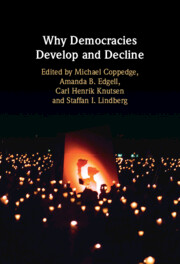Book contents
- Why Democracies Develop and Decline
- Why Democracies Develop and Decline
- Copyright page
- Contents
- Figures
- Tables
- Tables in Appendices
- Acknowledgements
- 1 V-Dem Reconsiders Democratization
- 2 The Ups and Downs of Democracy, 1789–2018
- 3 Long-Run Factors
- 4 International Influence
- 5 Economic Determinants
- 6 Political Institutions and Democracy
- 7 Democracy and Social Forces
- 8 Causal Sequences in Long-Term Democratic Development and Decline
- Appendices
- Bibliography
8 - Causal Sequences in Long-Term Democratic Development and Decline
Published online by Cambridge University Press: 28 June 2022
- Why Democracies Develop and Decline
- Why Democracies Develop and Decline
- Copyright page
- Contents
- Figures
- Tables
- Tables in Appendices
- Acknowledgements
- 1 V-Dem Reconsiders Democratization
- 2 The Ups and Downs of Democracy, 1789–2018
- 3 Long-Run Factors
- 4 International Influence
- 5 Economic Determinants
- 6 Political Institutions and Democracy
- 7 Democracy and Social Forces
- 8 Causal Sequences in Long-Term Democratic Development and Decline
- Appendices
- Bibliography
Summary
This chapter summarizes the explanations developed in preceding chapters, fits them into a more comprehensive theoretical framework, and tests them using path analysis, which helps researchers understand causal sequences. Democratization is characterized by punctuated equilibrium. Distant historical factors such as geography and demographic characteristics, together with incrementally changing aspects of social and economic development, affect a country’s level of democracy, but only roughly. Institutions and organizations such as a healthy civil society, the rule of law, and institutionalized political parties, tend to reinforce one another and keep each country’s level of electoral democracy close to an equilibrium or set point. However, short-term economic performance, anti-system movements, and opposition campaigns can sometimes disturb the equilibrium, making significant upturns and downturns possible.
Keywords
- Type
- Chapter
- Information
- Why Democracies Develop and Decline , pp. 215 - 261Publisher: Cambridge University PressPrint publication year: 2022
- 2
- Cited by

